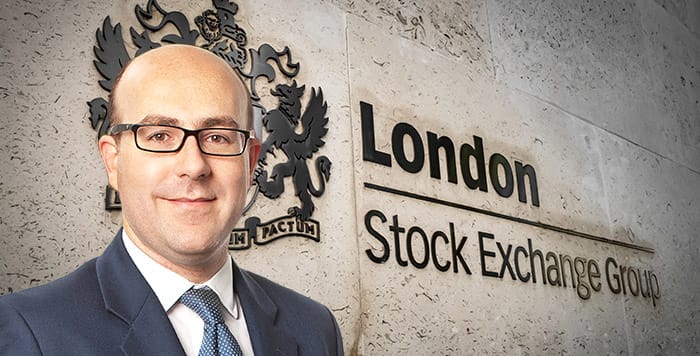Ahead of Legal Cheek’s latest student commercial awareness event, ‘Behind the deals that power the global economy’, White & Case’s Inigo Esteve tells us how he helps international companies list on the London Stock Exchange and shares his advice for students seeking to get into this branch of City law

A year after qualifying as a solicitor, an opportunity came the way of Inigo Esteve that has shaped his career ever since.
“I was a trainee doing plain vanilla bond issuances and then a partner came over and asked me if I had ten minutes to translate something,” recalls Esteve, who is a bilingual English and Spanish speaker.
The translation was of an email in relation to the listing of Banco Santander on the London Stock Exchange (LSE) in 2005, a key condition of its purchase of Abbey, one of the biggest deals in UK banking history.
“So I translated the email and then another and another. For language reasons I ended up becoming the main contact with the client. I didn’t know what on earth I was doing as it was my first equity deal but I had people around me who helped me and I spoke Spanish, which made the client’s life easier,” he remembers.
Having played a key role in the listing, Esteve, who graduated in law from Exeter University 18 years ago, found further LSE initial public offering (IPO) work coming his way and began to carve a niche in this area of capital markets law.
Now a partner at White & Case, he has since advised on IPOs covering everything from care homes to oil and gas companies to tech giants, alongside many more financial institution listings.
A lawyer’s role in this process — which companies or shareholders typically undertake to raise money for further investment — is as a kind of guide, leading the client through what is a very complex process. It starts with the drafting of a lengthy 300 or so page ‘prospectus’, containing detailed information about the company that is seeking to list, and ends with advice on the many new rules and regulations that post-IPO companies must follow.
No two listings are ever the same, and like many lawyers Esteve enjoys the human side of the work as well as the technical. “Spending time with the chief executives of companies is always interesting, as they tend to be pretty smart people. You always have to tailor your advice to their different characteristics and objectives — that’s a big part of the challenge,” he says.
Another notable element of the job is how international it is. When Legal Cheek Careers speaks to Esteve he is just off the plane from a 48 hour trip to Dubai, where he has been meeting with a number of clients. Other companies he assists are based in locations including Russia, Africa and elsewhere in the Middle East.
Each of Esteve’s IPOs typically requires several trips — starting with the initial pitch for the work, then a strategy meeting and at least one further drafting and advisory session. As part of the IPO shares are sold in the US and White & Case’s US law expertise comes into play as does its vast international network.
“Very often you have three sets of law: the local law of the client, UK law and New York law, so it’s a collaborative process making use of all our collective firm expertise,” explains Esteve.
While capital markets lawyers must have at least one eye on the deal, they need to keep tabs on the ebbs and flows of the global economy. At the moment, with President Trump’s escalating trade wars shaking the US’s relationship with China, a strengthening dollar giving headaches to countries like Turkey and Argentina which have borrowed heavily in the currency, and Brexit threatening to cause disruption in the UK and Europe, there is a lot going on.
Reflecting on this, Esteve describes himself as a “glass half full kind of person”, noting that “we have a very positive pipeline of work and things feel pretty good for now”. But he adds that “there are always bumps along the way”. The worst thing, he continues, perhaps with the ongoing Brexit negotiations in mind, “is not knowing — it’s that uncertainty which really affects my industry”. Still, Esteve is optimistic about London: “The London Stock Exchange remains the biggest pool of capital by far outside the US. We have the liquidity and financial services infrastructure and eco system that other locations lack.”
He is of a similarly positive mindset about the future of the corporate branch of the legal profession, which some have suggested could face disruption from new technologies such as artificial intelligence (AI). “AI and other new technologies are definitely going to play a part, particularly in relation to the more mundane parts of what lawyers do,” he says, “but while a machine can give you information there will always be a need for humans to tell you what to do with that information. Law at its heart is a people business.”
For students seeking to enter the legal profession and follow a similar path to his own, Esteve has three pieces of advice. The first is to do as much work experience as you can to find out what being a lawyer is actually like. “The vacation scheme I did opened my eyes: I enjoyed it and realised I wanted to be part of this world,” he remembers. The second related tip is to follow your passion. “I was always interested in business and finance, so I gravitated to the City — the challenge for me was finding out which part of it I wanted to work in,” he says. And finally, recalling that fateful request to translate the email on the Santander listing, Esteve urges future lawyers “to grab the opportunities you get as and when they come. You’ve got to take your chances.”
Inigo Esteve will be speaking alongside other White & Case lawyers at Tuesday’s ‘Behind the deals that power the global economy’ event. This event is now fully booked.

